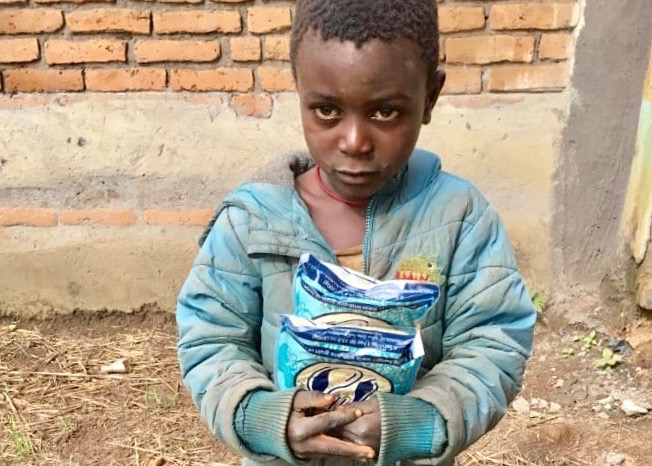Sodzi Village, Malawi … Through 7-year-old eyes, little Fatsani watched cautiously as Wilson and Griven prepared for the food distribution. Obviously, he was apprehensive of these strangers who came to his village from some unknown place far away. Griven saw him even as he approached suspiciously from a distance; a poor boy dressed in what might be his only set of clothes. He wore a grimy, tattered, blue jacket top, well past its prime, and a dark grey pair of worn, dirty shorts, and no shoes or socks.
They had brought a sizeable amount of food in the back of the Toyota, as a number of villages had been organized from this area to receive food on this particular day. The famine has reached a critical stage in this area, and children like Fatsani are especially vulnerable. In his hands holds tightly to some green guavas. Clearly, they were not ripe to eat, but for a boy who has had nothing to eat for two days, he is not going to lay aside this fruit even if it is not good to eat. Besides, he would not be eating for the pleasure of the taste, but simply in order to do something that would make the pain that wracked his body go away. Approaching from nearby were two men from Sodzi Village, and Griven learned that one, Matias Selelani, was Fatsani’s grandfather. He explained the boy’s mother had died, and his father was gone. There was no one to care for him but him. Too, he explained the silence Griven was seeing in Fatsani. “Silence is another language,” he explained. After this information soaked in Griven could almost imagine what Fatsoni was thinking.
“Does this man know how hungry I am?”
“Does he know our last meal was more than 24 hours ago?
“A person who has eaten would not eat these green fruits, but I have no choice.”
Griven recalls the moment, ‘I felt so sorry for Fatsani and his grandfather at that moment”.
When they received their food allotment the grandfather turned to Griven and said, “Thank you so much for this food. You have helped us so much.”
“I waved good-by, and they left for home with their bags of rice. What will happen to them in the coming days if we do not return with more food? They have nothing. We are their only hope.”
The allotment of food that was distributed that day in central Malawi was made possible through contributions of Universal Aide in Canada, World Emergency Relief in California, the Malawi Project in Indiana, Action for Progress in Malawi, and a small but determined contributor base that make the food aid possible. You can join this effort to save children like Fatsoni, with your financial contributions: www.malawiproject.org/donate/.

